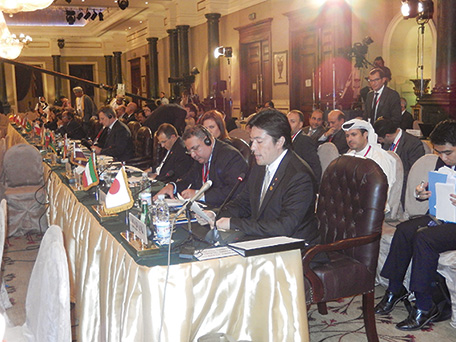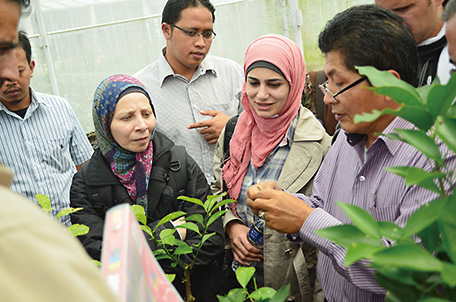(3) Middle East Peace (Palestine)
The Palestine issue is at the core of the Arab-Israeli conflict that has continued for more than half a century. Peace in the Middle East is an issue that wields significant impact on the stability and prosperity of Japan and the rest of the world. Japan supports a two-state solution whereby Israel and a future independent Palestinian state live side by side in peace and security. To promote this, it is essential to prepare for nation-building through socio-economic development of Palestine, which is one of the parties of the peace process. Since the establishment of the Palestinian Interim Self-Government Authority based on the Oslo Accords in 1993, the international community including Japan has been proactively extending assistance to the Palestinians.
Although Palestinians continue to feel significant discontent and antipathy towards the Israeli occupation, many years of occupation have made them economically dependent on the Israeli economy as well as on aid from the international community. These circumstances make the achievement of Middle East peace even more difficult. Widening regional disparities and a high unemployment rate driven by Israel's occupation policy and the sluggish economy are destabilizing factors in regional circumstances. Helping the Palestinian economy stand independently while improving living conditions for its people is the most important challenge in creating an environment where Palestinians can negotiate with Israelis for true peace.
< Japan's Efforts >

State Minister for Foreign Affairs Yasuhide Nakayama addressing a speech at the Conference on the Reconstruction of Gaza held in Cairo, Egypt, in October 2014.

Peacebuilding is one of the priority issues of development cooperation, and Japan has positioned its assistance to the Palestinians as one of the important pillars of its measures to contribute to the Middle East peace process. In particular, Japan has provided $1.47 billion in total to the Palestinians since the 1993 Oslo Accords, the third highest amount behind the United States and the European Union (EU). Specifically, Japan provides various types of humanitarian assistance through international organizations and NGOs to improve the tragic living conditions of the socially vulnerable people on the West Bank (including East Jerusalem) and people affected by conflict in the Gaza Strip, and others. Also, Japan proactively supports the Palestinian Authority to stabilize and improve its civil administration, enhance the administrative and financial capacity, and promote sustainable economic growth. These efforts aim for preparation for future Palestinian nation-building and a self-sustained Palestinian economy.
Furthermore, since July 2006, Japan has advocated the initiative of the “Corridor for Peace and Prosperity,” as its unique mid- to long-term effort for future peaceful coexistence and co-prosperity between the Israelis and the Palestinians. The initiative aims to promote socioeconomic development in the Jordan Valley area through regional cooperation among the four parties of Japan, Israel, Palestine and Jordan. Those four parties are working on the flagship project of the initiative, the establishment of an agro-industrial park in the suburbs of Jericho City. The park is expected to create about 7,000 jobs in the future.
In 2013, Japan launched a new initiative called the “Conference on Cooperation among East Asian Countries for Palestinian Development (CEAPAD)” to help Palestine achieve economic independence by drawing on Asia's experience on human resources development and private economic development. To date, meetings have been held on triangular cooperation for human resources development and on trade and investment expansion.
In 2014, to meet emergency needs following clashes between Israeli and Palestinian armed forces in the Gaza Strip, Japan extended about $7.8 million of food, water, and sanitation assistance through international organizations and Japanese NGOs. State Minister for Foreign Affairs Yasuhide Nakayama attended the Conference on the Reconstruction of Gaza held in Cairo in October, and called for the consolidation of the ceasefire and the steady implementation of reconstruction.
| Palestinian Territories
Human Resources Development Project (in Cooperation with Indonesia and Malaysia), Triangular Cooperation1
Technical Cooperation (April 2012 – Ongoing)

Participants from Palestine listening to an Indonesian expert explaining fruit cultivation production. (Photo: JICA)
Japan has been providing support for Palestinians on the basis of the belief that it is important for the Palestinian economy and society to be self-sustainable in order for a future independent Palestinian state and Israel to live side by side in peace. Most of the support for Palestine comes from the United States or European countries, while support from East Asian countries for Palestine has been very limited, apart from assistance coming from Japan. However, some East Asian countries that have achieved a certain level of economic growth, such as Indonesia and Malaysia, are today good partners of Japan in the development cooperation conducted in third countries.
Under such circumstances, Japan started a triangular cooperation initiative for Palestine in coordination with Indonesia and Malaysia, in order to provide support for the development of institutions and systems, as well as human resources in Palestine by utilizing the knowledge, experience, and economic power of East Asian countries. The first project of this initiative was a training program for Palestinian officials on industrial park management, which was conducted in Indonesia in 2011. During this training, the participants visited industrial parks in Southeast Asian countries including Indonesia, had meetings with personnel from operating agencies from both sides and tenant companies of these industrial parks, and learned specific and efficient ways to operate industrial parks.
The previous themes of trainings conducted in Indonesia and Malaysia covered various topics, including fixed assets tax, Islamic finance, improvement of fruit cultivation production, vegetable cultivation techniques, livestock feed, and improvement of productivity/KAIZEN. By the end of FY2013, a total of 119 Palestinians participated in the trainings.
This triangular cooperation initiative to assist Palestine, involving emerging countries in Asia, was launched in February 2013 under the initiative of Japan. Great appreciation for this initiative was expressed by both Palestine and East Asian countries at the second ministerial meeting of the Conference on Cooperation among East Asian Countries for Palestinian Development (CEAPAD) held in Jakarta, Indonesia, in March 2014. (As of August 2014)
*1 Cooperation provided by developing countries to other developing countries, using their own personnel and experiences in development, is called “South-South Cooperation.” Support by donors or international organizations for cooperation between such developing countries is referred to as “triangular cooperation.”
